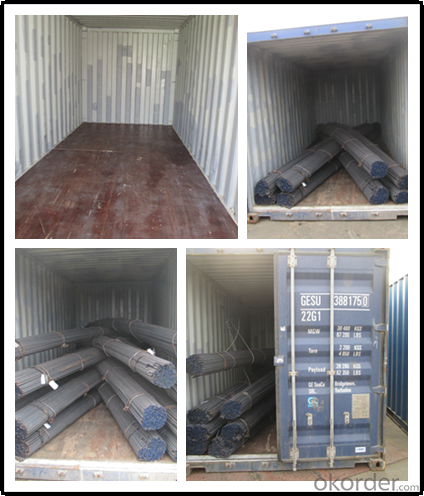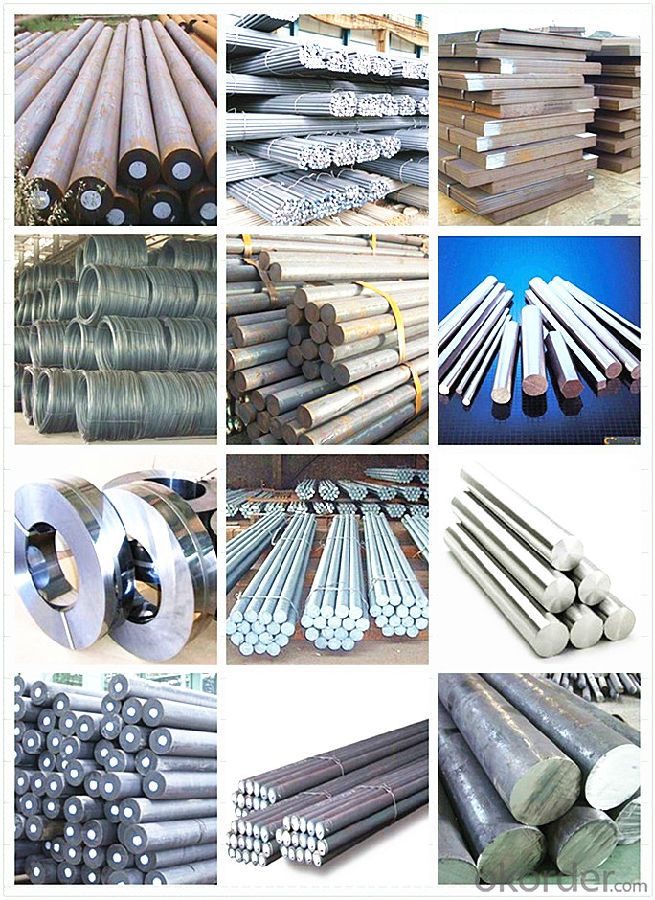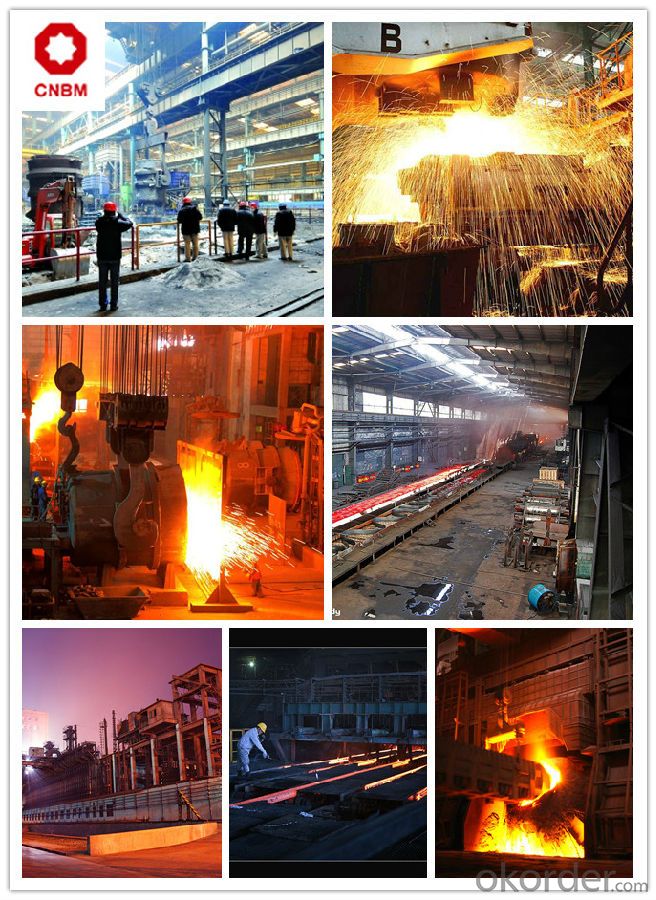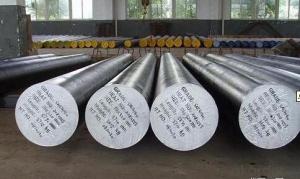DIN1.7225/SAE4140 CNBM Alloy Steel Round Bar with High Quality
- Loading Port:
- Tianjin
- Payment Terms:
- TT OR LC
- Min Order Qty:
- 3 m.t.
- Supply Capability:
- 10000 m.t./month
OKorder Service Pledge
OKorder Financial Service
You Might Also Like
Item specifice
DIN1.7225/SAE4140 Alloy Steel Round Bar Price
Name | DIN1.7225/SAE4140 Steel Round Bar |
Shape | Round Bar/Square Bar/Flat Bar/Plate/Wire |
Standard | GB/ASTM/SAE/AISI/DIN/JIS/EN/BS |
Surface Treatment: | Black/Peeling/Polished/Machined |
Delivery Condition: | Hot Rolled or Forged/Peeled or Black Surface |
Test | SGS/UT 100% Elements Testing |
Certificate: | ISO/Mill Certificate |
Service: | 24 hours online service / |
more than 20 years trading and manufacture | |
Quality Assurance: | the third party inspection, such as SGS, BV, TUV…etc. is acceptable |
Packaging Details: | seaworthy packaging or as per customer's packing instruction |
Chemical Composition
C | Si | Mn | Cr | Mo | P | S |
0.38-0.43 | 0.40max | 0.60-0.90 | 0.90-1.20 | 0.15-0.30 | ≤0.035 | ≤0.035 |
Application
4140 Alloy Steel is engineering steel supplied in quenched and tempered conditions.
Very good machinability.
High toughness.
High creep strength.
Repeated impact resistant capability.
Packaging & Delivery
Packaging Detail | Sea worthy packing /as per customer's packing instruction |
Delivery Detail | 15 ~ 40 days after receiving the deposit |

Product Show

Workshop

FAQ
Are you a trading company or manufacturer? | Manufacturer |
What’s the MOQ? | 3 metric ton |
What’s your delivery time? | 15-35 days after downpayment received |
Do you Accept OEM service? | Yes |
what’s your delivery terms? | FOB/CFR/CIF |
What's the Payment Terms? | 30% as deposit,70% before shipment by T/T |
Western Union acceptable for small amount. | |
L/C acceptable for large amount. | |
Scrow ,Paybal,Alipay are also ok | |
Why choose us? | Chose happens because of quality, then price, We can give you both. |
Additionally, we can also offer professional products inquiry, products knowledge train (for agents), smooth goods delivery, excellent customer solution proposals. | |
What's your available port of Shipment? | Main Port, China |
What’s your featured services? | Our service formula: good quality+ good price+ good service=customer's trust |
Where are your Market? | Covering more than 160 countries in the world |
- Q:What are the challenges in welding special steel?
- One of the major challenges in welding special steel is its high carbon content, which can lead to the formation of brittle microstructures and increased susceptibility to cracking. Additionally, special steels often have unique alloying elements and compositions, which require precise temperature control and specialized welding techniques to maintain their desired properties. Furthermore, the presence of impurities and contaminants in special steels can cause porosity and other defects during the welding process, requiring thorough pre-weld preparation and stringent quality control measures.
- Q:How does special steel contribute to the aerospace safety?
- Special steel contributes to aerospace safety in several ways. Firstly, special steel alloys such as titanium and stainless steel are used in the construction of critical components like landing gear, engine parts, and structural elements. These alloys offer high strength-to-weight ratios, corrosion resistance, and excellent heat resistance, ensuring the durability and reliability of aerospace structures. Moreover, special steel plays a crucial role in manufacturing precision instruments and tools used in aerospace maintenance and repair. These tools are essential for maintaining the safety and functionality of aircraft, ensuring accurate measurements, and facilitating effective repairs. Furthermore, special steel is utilized in the production of safety-critical fasteners, such as bolts and screws, which hold various aircraft components together. These fasteners need to withstand extreme forces and vibrations during flight, and special steel materials provide the necessary strength and durability to ensure their reliability. Overall, the use of special steel in aerospace applications enhances the safety of aircraft by providing robust and reliable materials for construction, maintenance, and repair, ultimately contributing to the overall integrity and performance of aerospace systems.
- Q:How does special steel perform in low-temperature applications?
- Special steel performs well in low-temperature applications due to its unique properties such as high strength, toughness, and resistance to brittleness. It retains its mechanical properties even at extremely cold temperatures, making it ideal for industries like aerospace, automotive, and energy where materials need to withstand challenging environments.
- Q:How does the addition of nickel enhance the properties of special steel?
- The addition of nickel enhances the properties of special steel by improving its strength, toughness, and corrosion resistance. Nickel forms a solid solution with iron, which increases the overall strength and hardness of the steel. It also enhances the toughness, making it more resistant to cracking and fractures. Additionally, nickel improves the corrosion resistance of special steel, making it suitable for applications in aggressive environments or industries such as marine, chemical, and oil and gas.
- Q:Can special steel be used in the mining equipment manufacturing industry?
- Yes, special steel can be used in the mining equipment manufacturing industry. Special steel, often known as alloy steel, offers improved strength, durability, and resistance to wear and corrosion compared to standard steel. These properties make it well-suited for the harsh and demanding conditions encountered in mining operations. Special steel can be utilized in various mining equipment components, such as drill bits, crushers, conveyor systems, and excavator buckets, to enhance their performance and prolong their lifespan.
- Q:Can special steel be used in the production of artistic sculptures?
- Yes, special steel can definitely be used in the production of artistic sculptures. Special steel, which refers to steel alloys that have been specifically designed and manufactured for particular applications, offers a wide range of advantages that make it suitable for creating sculptures. Firstly, special steel alloys provide exceptional strength and durability, allowing sculptors to create large and intricate structures that can withstand external forces and environmental conditions. This strength and resilience is crucial, especially for outdoor sculptures that are exposed to weather elements such as rain, wind, and extreme temperatures. Additionally, special steel alloys offer versatility in terms of shaping and forming. They can be easily molded and manipulated into various shapes and sizes, which allows artists to bring their creative visions to life. Sculptors can utilize different techniques such as welding, cutting, and bending to shape the steel into their desired forms, enabling them to create unique and captivating sculptures. Moreover, special steel alloys can be finished in various ways, such as polishing, painting, or coating, to enhance their aesthetic appeal. This allows artists to add different textures, colors, and surface finishes to their sculptures, further enhancing their artistic value. Furthermore, special steel alloys can also provide resistance to corrosion, which is particularly important for sculptures that are placed in outdoor or humid environments. This corrosion resistance ensures that the sculptures retain their visual appeal and structural integrity over time, reducing the need for frequent maintenance and repairs. In conclusion, special steel offers a wide range of advantages that make it an excellent choice for the production of artistic sculptures. Its strength, versatility, aesthetic appeal, and resistance to corrosion provide artists with the necessary tools to create visually stunning and durable sculptures that can be enjoyed for years to come.
- Q:What are the different types of high-strength steel?
- There are several types of high-strength steel, including high-strength low-alloy (HSLA) steel, ultra-high-strength steel (UHSS), dual-phase (DP) steel, and transformation-induced plasticity (TRIP) steel. Each type has unique properties and is used in various industries for applications that require exceptional strength and durability.
- Q:What are the factors affecting the machinability of special steel?
- There are several factors that can affect the machinability of special steel. 1. Alloying elements: The composition of special steel plays a significant role in its machinability. Some alloying elements, such as sulfur and lead, can improve machinability by creating free-cutting properties. On the other hand, elements like chromium and nickel can make the steel harder to machine. 2. Hardness: The hardness of special steel can impact its machinability. As the hardness increases, the steel becomes more difficult to machine. Harder steel requires higher cutting forces, which can result in increased tool wear and slower machining speeds. 3. Microstructure: The microstructure of special steel, including grain size and distribution, can affect its machinability. Fine-grained steels generally have better machinability compared to coarse-grained ones. Additionally, the presence of certain phases, such as carbides, can make machining more challenging. 4. Heat treatment: The heat treatment process used on special steel can influence its machinability. Some heat treatments, like annealing or stress relieving, can improve machinability by reducing hardness and internal stresses. Conversely, hardening treatments can increase hardness and make the steel more difficult to machine. 5. Cutting conditions: The choice of cutting parameters, such as cutting speed, feed rate, and depth of cut, can impact machinability. Optimal cutting conditions need to be selected to balance productivity and tool life. Inadequate cutting conditions can lead to excessive tool wear, poor surface finish, and reduced machining efficiency. 6. Tool material and geometry: The selection of cutting tools is crucial to the machinability of special steel. The tool material must have appropriate hardness, toughness, and wear resistance to withstand the cutting forces generated during machining. The tool geometry, including rake angle and relief angle, also affects chip formation and heat dissipation, which can influence machinability. 7. Lubrication and cooling: The use of proper lubrication and cooling methods is essential for good machinability. Lubricants help reduce friction and heat generation during machining, while cooling methods, such as flood cooling or misting, can dissipate heat and prolong tool life. Insufficient lubrication or cooling can result in increased tool wear, surface finish issues, and reduced machinability. Overall, the machinability of special steel is influenced by a combination of factors related to its composition, microstructure, heat treatment, cutting conditions, tooling, and cooling methods. Understanding and optimizing these factors can lead to improved machinability and productivity in machining special steels.
- Q:How does special steel perform in cryogenic environments?
- Special steel performs exceptionally well in cryogenic environments. Cryogenic temperatures refer to extremely low temperatures below -150°C (-238°F), and special steel is specifically designed to withstand and excel in such conditions. One of the key properties of special steel is its ability to maintain its strength and toughness even at low temperatures. Unlike other materials that become brittle and prone to fractures in cryogenic environments, special steel retains its mechanical properties, ensuring structural integrity and reliability. This characteristic is crucial in applications where safety is paramount, such as in the aerospace and nuclear industries. Moreover, special steel exhibits excellent resistance to corrosion and oxidation, even at cryogenic temperatures. This resistance is essential as cryogenic environments often involve the presence of gases, liquids, or chemicals that can accelerate corrosion. Special steel's resistance to corrosion ensures its longevity and minimizes the risk of material degradation, thereby enhancing the overall performance and lifespan of equipment or structures. In addition to its mechanical and corrosion-resistant properties, special steel also possesses good thermal conductivity. This property allows for efficient heat transfer, which is particularly important in cryogenic environments where temperature control and management are critical. The ability of special steel to efficiently conduct heat ensures that equipment and structures remain at the desired low temperatures without any significant thermal variations. Furthermore, special steel's suitability for cryogenic environments is evident in its wide range of applications. It is commonly used in cryogenic storage tanks for liquefied gases, such as liquid oxygen, nitrogen, and argon. Special steel is also employed in the construction of cryogenic pipelines, valves, and other components, where its exceptional performance ensures the safe transport and containment of cryogenic fluids. In conclusion, special steel performs exceptionally well in cryogenic environments due to its retained strength and toughness, resistance to corrosion, good thermal conductivity, and wide range of applications. Its ability to withstand extreme cold temperatures makes it a reliable and preferred choice for various industries requiring dependable performance in cryogenic conditions.
- Q:How does special steel perform in cryogenic applications?
- Special steel is renowned for its exceptional performance in cryogenic applications, characterized by extremely low temperatures that fall below -150 degrees Celsius (-238 degrees Fahrenheit). Unlike regular steel, which tends to become brittle and weaker in such conditions, special steel, also referred to as cryogenic steel or low-temperature steel, is specifically engineered to withstand these extreme cold temperatures. One of the key advantages of special steel lies in its ability to maintain its mechanical properties even at cryogenic temperatures. It retains its strength, toughness, and ductility, enabling it to endure the stresses and strains imposed on it in cryogenic environments. As a result, special steel finds application in various fields, including aerospace, energy, and healthcare, where it is used in cryogenic storage tanks, pipelines, and equipment. Another significant feature of special steel is its excellent resistance to brittle fracture at low temperatures. This is of utmost importance since brittle fractures occur when materials become excessively brittle and fail under stress. The distinct composition and processing methods employed in special steel help prevent such fractures, ensuring the integrity and safety of components within cryogenic systems. Furthermore, special steel possesses a low coefficient of thermal expansion, meaning it undergoes minimal dimensional changes when exposed to temperature fluctuations. This characteristic proves highly advantageous in cryogenic applications as it preserves the stability and reliability of equipment and structures. Additionally, special steel exhibits commendable corrosion resistance, which is vital in cryogenic environments where the presence of moisture and certain chemicals can accelerate corrosion processes. By resisting corrosion, special steel enhances the longevity and durability of components, thereby reducing maintenance and replacement costs. In conclusion, special steel is the preferred choice for cryogenic applications due to its ability to maintain mechanical properties, resist brittle fracture, display low thermal expansion, and exhibit corrosion resistance. These properties render it a dependable and efficient material for use in cryogenic systems, providing the necessary strength and durability even under extremely low-temperature conditions.
1. Manufacturer Overview |
|
|---|---|
| Location | |
| Year Established | |
| Annual Output Value | |
| Main Markets | |
| Company Certifications | |
2. Manufacturer Certificates |
|
|---|---|
| a) Certification Name | |
| Range | |
| Reference | |
| Validity Period | |
3. Manufacturer Capability |
|
|---|---|
| a)Trade Capacity | |
| Nearest Port | |
| Export Percentage | |
| No.of Employees in Trade Department | |
| Language Spoken: | |
| b)Factory Information | |
| Factory Size: | |
| No. of Production Lines | |
| Contract Manufacturing | |
| Product Price Range | |
Send your message to us
DIN1.7225/SAE4140 CNBM Alloy Steel Round Bar with High Quality
- Loading Port:
- Tianjin
- Payment Terms:
- TT OR LC
- Min Order Qty:
- 3 m.t.
- Supply Capability:
- 10000 m.t./month
OKorder Service Pledge
OKorder Financial Service
Similar products
New products
Hot products
Related keywords

































